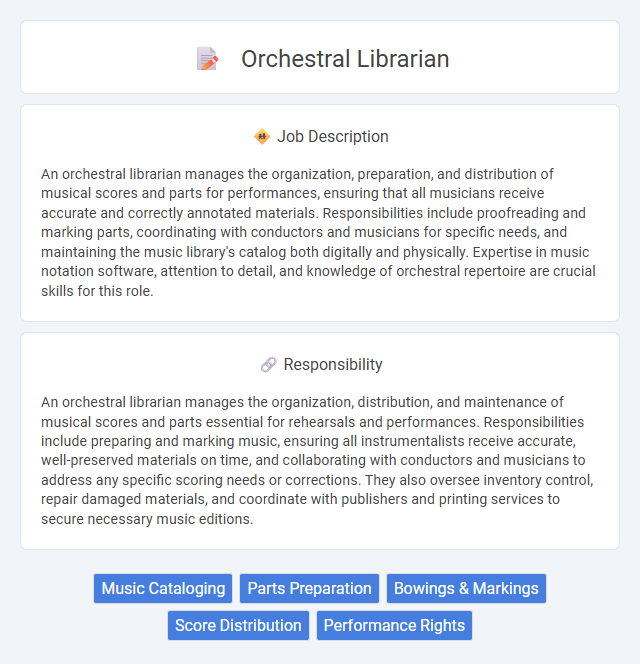
An orchestral librarian manages the organization, preparation, and distribution of musical scores and parts for performances, ensuring that all musicians receive accurate and correctly annotated materials. Responsibilities include proofreading and marking parts, coordinating with conductors and musicians for specific needs, and maintaining the music library's catalog both digitally and physically. Expertise in music notation software, attention to detail, and knowledge of orchestral repertoire are crucial skills for this role.
People who are highly organized and detail-oriented will likely excel as orchestral librarians since the job requires managing complex music collections and ensuring precise score preparation. Individuals with strong communication skills and the ability to work collaboratively in fast-paced environments may find this role fulfilling and well-suited to their strengths. Those who prefer repetitive, solitary tasks without much social interaction might find the demands of coordinating with musicians and conductors less compatible with their preferences.
Qualification
An orchestral librarian requires a deep understanding of music notation, orchestration, and score preparation, typically supported by a degree in music or library science. Proficiency in using digital notation software such as Finale or Sibelius and strong organizational skills are essential for managing sheet music, parts, and archival materials efficiently. Experience in an orchestral environment or with ensemble logistics enhances the ability to support conductors and musicians during rehearsals and performances.
Responsibility
An orchestral librarian manages the organization, distribution, and maintenance of musical scores and parts essential for rehearsals and performances. Responsibilities include preparing and marking music, ensuring all instrumentalists receive accurate, well-preserved materials on time, and collaborating with conductors and musicians to address any specific scoring needs or corrections. They also oversee inventory control, repair damaged materials, and coordinate with publishers and printing services to secure necessary music editions.
Benefit
An orchestral librarian likely provides significant benefits by ensuring musicians have accurate, well-organized sheet music, which increases rehearsal efficiency and performance quality. This role probably enhances overall ensemble coherence by managing music materials and promptly addressing any score issues. The position may also reduce administrative burdens on conductors and musicians, allowing them to focus more on artistic interpretation.
Challenge
The role of an orchestral librarian likely involves the challenge of managing vast collections of scores and parts with precision and efficiency. It is probable that tight deadlines and last-minute changes stress the ability to stay organized under pressure. Maintaining clear communication between conductors, musicians, and production teams may present ongoing complexities in ensuring smooth performances.
Career Advancement
Orchestral librarians manage music scores and parts, ensuring precise organization and timely distribution for rehearsals and performances, which enhances their expertise in music administration. Progression to senior librarian roles or positions in major symphony orchestras offers opportunities to lead teams, curate extensive music libraries, and influence programming decisions. Developing strong relationships with conductors, musicians, and publishers further accelerates career advancement within prestigious orchestral environments.
Key Terms
Music Cataloging
Orchestral librarians specialize in music cataloging, meticulously organizing and maintaining extensive collections of sheet music, manuscripts, and scores for orchestras. They use professional cataloging systems to ensure easy retrieval and accurate record-keeping, enhancing rehearsal efficiency and performance preparation. Expertise in music notation, history, and digital database management is essential for optimizing access to musical resources.
Parts Preparation
Orchestral librarians specialize in parts preparation by meticulously organizing and marking sheet music for conductors and musicians to ensure seamless rehearsals and performances. They verify and correct parts, create clear and readable copies, and manage the distribution of materials to each instrumentalist. Precision in page turns, bowings, and instrument-specific annotations is crucial to optimize the orchestra's performance efficiency.
Bowings & Markings
Orchestral librarians meticulously manage bowings and markings to ensure consistent interpretation and precise execution by musicians. They coordinate closely with conductors and principal string players to distribute accurate, clearly marked parts that reflect bow direction, dynamics, and articulation. This attention to detail enhances ensemble cohesion and facilitates efficient rehearsals and performances.
Score Distribution
Orchestral librarians specialize in score distribution, meticulously preparing and delivering individual parts from the full score to musicians, ensuring accuracy and proper cue markings. Their role includes organizing digital and physical scores for rehearsals and performances, maintaining version control to prevent errors during live performances. Mastery of music notation software and clear communication with conductors and musicians are essential for effective score management.
Performance Rights
Orchestral librarians manage and organize sheet music, ensuring all performance materials comply with copyright laws and performance rights agreements. They coordinate with rights organizations like ASCAP, BMI, and SESAC to secure proper licensing for live and recorded performances, avoiding infringement issues. Accurate tracking and reporting of performed works protect the orchestra legally while supporting composers' royalties.
 kuljobs.com
kuljobs.com